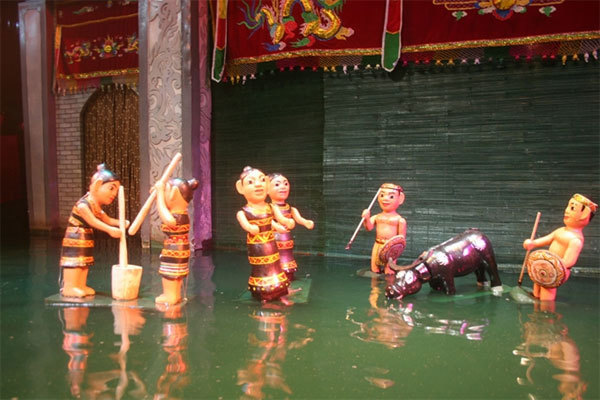As an initiative thought up by Director Le Quy Duong, head of the festival’s organising board, the week-long festival this year expanded the space for performances beyond stages.
The artists took part in workshops, seminars and performances at the hotel where they stayed, public areas and at beauty spots around the city.
The festival successfully provided participants with emotions, experiences and memories.
The APB festival this year gathered troupes from Chulalongkorn University (Thailand), Korea National University of Arts (South Korea), Shanghai Theatre Academy (China) and the National School of Drama (India), among others. Vietnam hosted the festival thanks to collaboration between the MP Centre for Performing Arts Training and the Vietnam Stage Artists Association.
With the theme Meeting in Hanoi – City for Peace, the directors and their students visited the Temple of Literature, the National Museum of History, Thang Long Water Puppetry Theatre, President Ho Chi Minh’s Mausoleum and Ha Long Bay.
 |
| The water puppetry of Vietnam. (Illustrative image -- File photo) |
“We focused on performing arts exchange and promoting culture and tourism potential in Hanoi,” said Duong.
“The programme was appreciated by the participants, who performed in various places, not only theatre stages,” he said.
“The new model provided more challenges for students and artists. They had to adapt their skills and imaginations. They had to connect and share different cultures. They learned to perform anywhere as long as there was an audience.”
“Apart from learning and sharing performing experiences, they also had a chance to approach local culture and discover beautiful sights to enrich their knowledge and real-life experiences,” Duong added.
Duong said Vietnamese tourism had become more popular thanks to well-known films such as The Quiet American, L'amant (The Lover) and Kong: Skull Island.
“It’s time we can use performing arts as a mean to promote our culture and tourism,” he said.
For director Steven P C Fernandez from the Integrated Performing Arts Guide Academy (Philippines), the opportunity to perform in Hanoi opened up more of Southeast Asia’s wondrous treasures.
“Hanoi will forever be remembered in our theatre lives, etched deep in a unique experience where improvisation and non-conventional theatre took practical meaning,” he said.
He will never forget the performance put on by his students at the Temple of Literature.
“It’s very emotional as we can connect with each other and connect with audiences in a public space,” he said.
“I believe that it’s a new form of stage art in modern times. We have to connect modern creations with traditional values. This form of art goes beyond theoretical academic lectures, and overcomes barriers of languages and cultural differences.”
“To say Hanoi is amazing is an understatement,” he said.
“Its people, coffee, sidewalk restaurants and gastronomy are all fascinating. As an ancient city founded in 1010, Hanoi now stands proud having for many, many times and years rejected foreign colonisation.”
“Ironically, how little we knew about this ancient city. We have been offered invaluable experiences to see and feel the culture of Vietnam and other countries at this festival.”
Tobias Biancone, general director of the International Theatre Institute (ITI) highly appreciated the idea.
“I consider Vietnam to be a fertile ground for new initiatives,” he said.
“In Asia you can experience other ways of expressions for a performance. Very often, it is not just a play of speech, but the work includes the arts in their entirety: visual arts, music, poetry, acrobatics, dance, and so on.”
“The expressions in Asia are distinctively different and diverse. These performances do not get enough space to be shown on stage.”
“I am convinced the APB festival may play a main role in the empowerment of the performing arts in its regions. In using the fertile ground in Hanoi, the APB festival is able to create a bright future for Asia-Pacific performing arts, its participants and its people,” he said.
Cara Patricia Rose Severino from Wollongong University (Australia) said the festival offered students like her useful knowledge and amazing experiences.
“I learnt body gestures and voice performances from different cultures. I like the traditional dance of the Philippines and the water puppetry of Vietnam.”
“It’s interesting to share knowledge and experiences with others. We carried out performances creatively at unexpected spaces. We were all given challenges and passed through the challenges in an artistic and creative way,” she said.
Prof Suresh Shama from India acknowledged the importance of professional stages but said a performance doesn’t need to take place on a well-directed and stage.
“Modern performances should have a powerful inner strength so they can take place anywhere,” he said.
“We work toward a performing art in which we come closer to each other, and to audiences. It requires both teachers and students to upgrade their skills to adapt and get on well with unexpected changes of the world.”
“It’s the innovative idea of eliminating old rules which limit our creativity and separate us in each one’s tradition,” Shama said.
“Some troupes performed at the conference hall at the hotel, some were given the space in the corridor. The festival agenda contained many unexpected things that changed my opinion about modern performing art.”
“Places that are supposed to be unsuitable for performing are the places where performing art is needed most,” he said.
The delegates were determined that the initiative set at the APB Festival 2019 will be implemented in the years to come. VNS
Minh Thu
 Over 140 directors and students from performing arts academies in 16 countries gathered in Hanoi for the Asia-Pacific Bond (APB) of Theatre Schools Festival earlier this month.
Over 140 directors and students from performing arts academies in 16 countries gathered in Hanoi for the Asia-Pacific Bond (APB) of Theatre Schools Festival earlier this month.